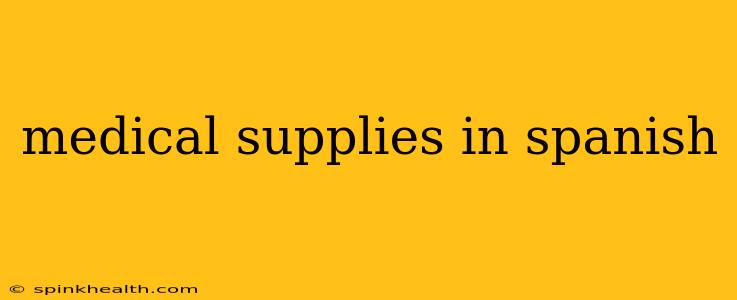Navigating the world of medical supplies can be tricky, even more so when language barriers are involved. This guide will delve into the Spanish vocabulary surrounding medical supplies, helping you confidently communicate your needs whether you're traveling, working in a healthcare setting, or simply need to understand medical information in Spanish. Let's embark on this journey together!
What are the most common medical supplies in Spanish?
This is a broad question, as the term "medical supplies" encompasses a vast array of items. However, we can break it down into common categories and their Spanish equivalents. Imagine yourself needing to purchase these items at a pharmacy (farmacia) or medical supply store (proveedor de suministros médicos). What would you say?
- Bandages (Vendajes): This is a basic yet crucial item. You might need a simple bandage (una venda simple), a gauze bandage (una venda de gasa), or an adhesive bandage (una tirita or un curita - these last two are more colloquialisms).
- Antiseptics (Antisépticos): Essential for cleaning wounds, you'll find various options like hydrogen peroxide (peróxido de hidrógeno), alcohol (alcohol), or antiseptic wipes (toallitas antisépticas).
- Pain Relievers (Analgésicos): From ibuprofen (ibuprofeno) to acetaminophen (paracetamol), knowing the Spanish names for common pain relievers is crucial. Don't forget to check the dosage instructions carefully!
- Thermometers (Termómetros): Whether digital (digital) or mercury (de mercurio - although less common now), knowing how to ask for a thermometer will be essential during any illness.
- Syringes and Needles (Jeringas y Agujas): These terms are straightforward, but it's crucial to know them, especially if you need to administer injections. Always ensure you're using sterile supplies and have appropriate training if needed.
What are some medical instruments in Spanish?
Beyond basic supplies, medical instruments require more precise terminology. This section will equip you with the vocabulary for more specialized tools.
- Stethoscope (Estetoscopio): A fundamental tool for any doctor or nurse.
- Blood Pressure Cuff (Tensión arterial o Esfigmomanómetro): Essential for monitoring blood pressure.
- Scalpel (Bisturí): A surgical instrument used for making incisions.
- Scissors (Tijeras): While seemingly simple, surgical scissors (tijeras quirúrgicas) are specifically designed for medical use.
- Tweezers (Pinzas): Used for grasping small objects during surgery or wound care.
How do I ask for medical supplies in Spanish?
Approaching a pharmacy or medical supply store requires clear communication. Here are some phrases that can be very helpful:
- "¿Tiene vendas?" (Do you have bandages?)
- "¿Necesitaría un termómetro?" (I need a thermometer)
- "¿Dónde puedo encontrar analgésicos?" (Where can I find pain relievers?)
- "¿Tiene alcohol antiséptico?" (Do you have antiseptic alcohol?)
What are some common medical terms related to supplies?
Knowing related terms will enhance your understanding of medical conversations and instructions.
- Sterile (Estéril): Crucial for preventing infection.
- Disposable (Desechable): Many medical supplies are disposable for hygiene purposes.
- Prescription (Receta): Some medical supplies require a prescription from a doctor.
- Over-the-counter (Sin receta médica): Many common medical supplies can be purchased without a prescription.
Where can I find medical supplies in Spanish-speaking countries?
Locating medical supplies varies depending on the country. Pharmacies (farmacias) are readily available in most areas. Larger cities often have specialized medical supply stores (proveedores de suministros médicos). Online retailers also offer a wide selection, but it's always wise to check reviews and ensure legitimacy before ordering.
This guide is designed to be a starting point in your journey of understanding medical supplies in Spanish. Remember that regional variations in vocabulary exist, but this comprehensive overview provides a solid foundation for your communication needs. Stay safe and healthy!

